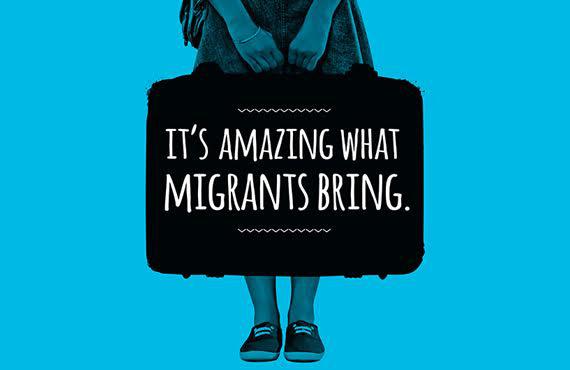DD: Could you tell us about the International Organization for Migration’s #MigrantHeroes campaign?
IV: In many parts of the world, there is an increasingly negative perception of migrants and their contribution to society. The International Organization for Migration (IOM) seeks to change the lens through which people view migrants and migration. To this end, IOM has launched a new perception change campaign, #MigrantHeroes, to highlight the many ways in which migrants contribute to their countries of origin and host communities. Moreover, this campaign will build upon and reinforce the recently concluded IOM Migrants Contribute Campaign in countering misinformation by presenting evidence of the positive impacts of migrants in accessible ways. Through the Migrant Heroes campaign, IOM seeks to share the migrants’ personal stories, their testimonies and what makes them a “hero”. The #MigrantHeroes campaign will be the starting point of a wider-scale project that will be launched on the occasion of IOM’s 65th anniversary in 2016, entitled the Migrant’s Path—Oral History Project. Its main aim will be to capture the authentic voices of global migration for posterity and to showcase them as part of IOM’s anniversary. The #MigrantHeroes campaign will highlight the various patterns of migrants’ journeys and how they have positively contributed to their countries of origin, transit and destination.
DD: What are some of the most striking things about the International Organization for Migration? What are the most interesting parts about your job?
IV: Whether due to war or natural disaster, people will always be forced to migrate. The goal is that migration be done in a safe and orderly manner and humanely, and that people know they can get to their final destination. IOM was set up after the Second World War, although it had a different name back then, to help Europeans resettle or settle into new homes. The challenges back then are the same today—to facilitate a humane and safe migration of people. Humans will always be mobile because they want to look for better opportunities, and that is what IOM is here to do, to help.
One of the great parts of the job is helping to get the message out on the importance of the work that is being done and bringing attention to the people that need help. The latest challenges have been the situation in the Mediterranean Sea and also in the Bay of Bengal. The onus has been on us as the leading migration agency globally to bring the plight of these migrants and refugees to the world’s attention and to get the story to the media so that it receives worldwide coverage.
The media will come to you when they know that you are credible and will give them timely and useful information. You become the “go to” agency in your area. IOM fields approximately 70–100 calls within 24–48 hours during busy periods. IOM is utilizing whatever communication tools we have available to us, like Skype, the United Nations studios and our own studio that we just set up so we could do live interviews quickly and efficiently. The main thing is that the media won’t simply come to you because you are an international organization, they will come to you if you give them credible and timely information.
DD: If you were to give one key message to people reading this, what would it be?
IV: We live in an era of unprecedented mobility. More people are on the move today in absolute terms than ever before in human history. Roughly one out of every seven people on the planet today is a migrant, including some 232 million international migrants and 740 million internal migrants, and billions more are affected by the fact that those migrants are on the move. We also know that this trend is expected to continue, with an estimated 400 million international migrants by 2040. The #MigrantHeroes campaign will significantly add to all our efforts to challenge and dispel the many and all too common myths and misconceptions about migrants. Ultimately, it is only then that politicians will be pushed to develop fact-based policies and legislative frameworks that respond to the real needs while promoting the protection and integration of migrants in host societies. Having experienced life as a migrant/expat in Africa, Europe and the Middle East, I am truly excited about the prospects of getting more stories out there about migrant heroes.
Contributor

Itayi Viriri is a Media and Communications Officer and spokesperson for the International Organization for Migration.


Post a comment